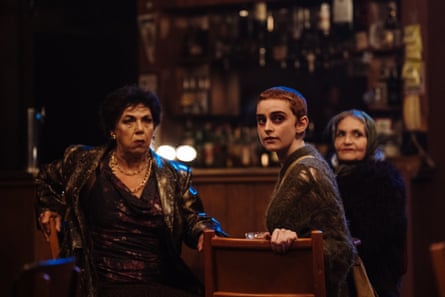Audiences arriving to find the RSC’s studio stage fitted out with bar stools may worry they have accidentally booked for Conor McPherson’s The Weir or Roddy Doyle’s Two Pints, plays set in Irish pubs.
This one, though, is Scottish and run by Macbeth, a Glaswegian gangster, and his wife who might be called, in this reading, Landlady Macbeth. The hostelry is unnamed, though we might guess the King’s Head as the action of Shakespeare’s tragedy is largely unchanged by relocation. Duncan, a camel-coated drug kingpin with a cheek scar like chain mail, stays in one of the rooms available but wouldn’t post a good review on TripAdvisor.
Classical purists might react to this ale-house version by wondering what else the RSC couldn’t be trusted to organise in a brewery. But having concluded after a Macbeth crawl in 2023 – seeing five productions in quick succession – that there was probably no new way of doing the play, Daniel Raggett’s audacious staging proved me wrong.
The text adapts enjoyably well to a drinking den. When Banquo asks, “Give us a light there!”, the landlady chucks him a disposable Bic. Wielding flick knives, the thugs still call them “swords” but that – and the tendency to address each other as kings and princes feels reasonably within the grandiose rhetoric of gangsters. Banquo’s ghost ambushes a fish-and-chip wake for Duncan.

Textual trimming is consistently intelligent. Several minor characters – including Old Man and two Doctors – are combined in a single Catholic priest, justified by the text’s use of the honorific “father” for seniors, and also adding a background element of Celtic sectarianism. Christopher Patrick Nolan plays this confessor to killers with searing creepiness.
The biggest challenge is the sinister sisters as, even for those who have had a few, boozers don’t obviously (beyond The Weir) involve the supernatural. Raggett reimagines the weird trio as tough, judgmental table-sharing tipplers who make the problematic “Hecate” haunting scenes into a sort of seance during a lock-in. This is genuinely scary as is the whole staging – played fast with alarming sudden blackouts. The context of gangland turf wars creates a terrible and tangible jeopardy once Macbeth has killed the big man.

Initially risking seeming more like the petty crook Macheath (in the Beggar’s/ Threepenny Operas), Sam Heughan achieves full tragic weight, especially in the soliloquies, with “Tomorrow and tomorrow” daringly staged as a duet with a dead character. Lia Williams’ revelatory Lady Macbeth makes the verse vernacular, a line such as “here’s the smell of the blood still” sounding as modern as the Pinter and Mamet in which she previously excelled. Avoiding the stereotypical scold, she is clearly the brains of the relationship. And, without adding or rewriting speech, her role is also expanded through four additional silent scenes, deeply painful, animating the anguish of a woman who lost a child.
The ubiquity of Macbeth stagings can risk the play seeming small beer but this is vintage scotch.

 2 months ago
62
2 months ago
62

















































